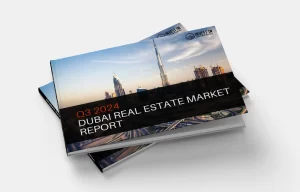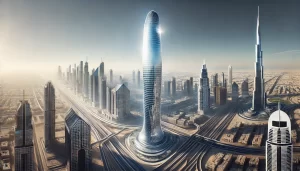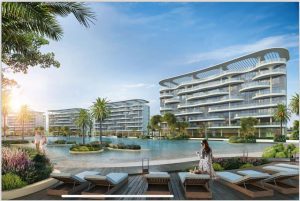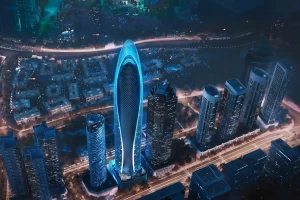Introduction
The first half of 2024 has seen significant developments in the Dubai real estate market. This report provides an overview of key trends, market performance, and future outlook, highlighting the resilience and growth of the sector amidst global economic challenges.
Market Trends
Continued Demand for Luxury Properties
Dubai’s luxury real estate market continues to thrive, driven by high-net-worth individuals (HNWIs) and foreign investors. New high-end developments, such as Violet at Damac Hills 2, have attracted significant interest due to their modern design, premium amenities, and strategic locations. The influx of millionaires into Dubai, now totaling 72,500, underscores the city’s appeal as a global hub for the wealthy.
Rise in Property Values
Property values in Dubai have seen a steady increase in H1 2024. According to recent reports, average property prices have risen by 5-7% compared to the same period in 2023. This growth is attributed to limited supply in prime areas, increased demand for high-quality living spaces, and a favorable economic climate.
Increased Rental Yields
Rental yields in Dubai have also improved, making the city an attractive destination for property investors. Average rental yields have increased to 6-8%, with some areas, particularly those close to business hubs and entertainment districts, seeing even higher returns. This trend is supported by a strong expatriate population and ongoing economic diversification efforts.
Market Performance
Residential Sector
The residential real estate sector in Dubai has shown robust performance in H1 2024. Sales volumes have increased by 10% year-on-year, with a notable shift towards townhouses and villas. Developments like Violet at Damac Hills 2, offering spacious and luxurious living spaces, have been particularly popular.
Commercial Sector
Dubai’s commercial real estate sector has also experienced growth, albeit at a slower pace than the residential sector. Office space demand has risen due to the influx of new businesses and the expansion of existing ones. Co-working spaces and flexible office solutions have gained traction, catering to the evolving needs of a dynamic workforce.
Retail Sector
The retail sector in Dubai remains resilient, supported by a strong tourism industry and consumer spending. High-end retail spaces and malls continue to attract both local and international brands. Retail footfall has increased by 8% in H1 2024, reflecting a recovery from the pandemic-induced slowdown.
Future Outlook
Sustainable Development
Sustainability continues to be a key focus in Dubai’s real estate market. Developers are increasingly incorporating green building practices and sustainable designs into their projects. This trend is expected to grow, driven by both regulatory requirements and consumer preferences.
Technological Integration
The integration of technology in real estate is transforming the market. Smart homes, AI-driven property management, and virtual reality tours are becoming standard offerings. These innovations enhance the living experience and streamline property transactions, making the market more efficient and attractive.
Investment Opportunities
Dubai’s real estate market offers promising investment opportunities, particularly in emerging areas and luxury segments. The government’s proactive policies, such as long-term visas for investors and property buyers, further bolster investor confidence. As the city prepares for major events like the COP28 climate conference, the demand for high-quality real estate is expected to remain strong.
Conclusion
The first half of 2024 has been a dynamic period for Dubai’s real estate market, characterized by growth in property values, increased demand for luxury and sustainable properties, and improved rental yields. With a favorable economic environment, strategic government initiatives, and ongoing infrastructure development, Dubai continues to solidify its position as a leading global real estate destination. Looking ahead, the market is poised for sustained growth, offering ample opportunities for investors, developers, and residents alike.





